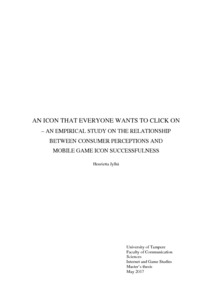An icon that everyone wants to click on : an empirical study on the relationship between consumer perceptions and mobile game icon successfulness
Jylhä, Henrietta (2017)
Jylhä, Henrietta
2017
Informaatiotutkimuksen ja interaktiivisen median tutkinto-ohjelma - Degree Programme in Information Studies and Interactive Media
Viestintätieteiden tiedekunta - Faculty of Communication Sciences
This publication is copyrighted. You may download, display and print it for Your own personal use. Commercial use is prohibited.
Hyväksymispäivämäärä
2017-06-07
Julkaisun pysyvä osoite on
https://urn.fi/URN:NBN:fi:uta-201706091901
https://urn.fi/URN:NBN:fi:uta-201706091901
Tiivistelmä
Mobile games market has been touted as the fastest growing gaming sector in the world. Every day thousands of new mobile games are published to join millions of others on app stores. The competition for top grossing mobile games is fierce, and the way a game is represented greatly contributes to its commercial success. When browsing for mobile games, consumers search for an icon they want to click on. However, most mobile games fail to engage consumers who browse past hundreds of icons on app stores daily. This leads us to the following questions: how do consumers perceive mobile game icons and what are the aesthetic qualities that make an icon successful in the sense that it incites consumers to click?
This thesis investigates the relationship between consumer perceptions of mobile game icons and icon successfulness (i.e. consumer overall evaluation of the icon and their willingness to click the icon as well as download and purchase the mobile game).
An online survey was constructed for respondents (respondent n = 569) to evaluate 4 randomized icons each from a total set of 68 mobile game icons with a classification of four dominant icon attributes: abstract, concrete, character and text. The evaluation was done by using semantic differential scales of 22 adjective pairs leading into a total of 2276 icon evaluations that form the data of the study (icon evaluation n = 2276).
The results indicate that consumers are more likely to give a higher grade to icons and click them as well as download and purchase the mobile game that the icon belongs to, when the icons are perceived beautiful, good, unique, professional, expensive, soft, exciting, strong, relaxed, realistic and quiet. Additionally, adjectives masculine, young, active, colorful, three-dimensional, happy and simple predict a higher grade; adjectives active, two-dimensional, colorless, masculine, happy and young predict clicking; adjectives active, happy, simple and young predict downloading and; adjectives sad, colorless and fast predict purchasing. Furthermore, the study investigated the factorial structure of perceptions towards icons, or in other words, which adjectives are likely to occur together in user evaluation for any given icon. The results show that the following factors can be identified: value, potency, activity, integrity and complexity.
This study was one of the first attempts to understand consumer perceptions of mobile game icon successfulness. The results may be helpful for future research as well as to game companies when designing mobile game icons for app stores.
This thesis investigates the relationship between consumer perceptions of mobile game icons and icon successfulness (i.e. consumer overall evaluation of the icon and their willingness to click the icon as well as download and purchase the mobile game).
An online survey was constructed for respondents (respondent n = 569) to evaluate 4 randomized icons each from a total set of 68 mobile game icons with a classification of four dominant icon attributes: abstract, concrete, character and text. The evaluation was done by using semantic differential scales of 22 adjective pairs leading into a total of 2276 icon evaluations that form the data of the study (icon evaluation n = 2276).
The results indicate that consumers are more likely to give a higher grade to icons and click them as well as download and purchase the mobile game that the icon belongs to, when the icons are perceived beautiful, good, unique, professional, expensive, soft, exciting, strong, relaxed, realistic and quiet. Additionally, adjectives masculine, young, active, colorful, three-dimensional, happy and simple predict a higher grade; adjectives active, two-dimensional, colorless, masculine, happy and young predict clicking; adjectives active, happy, simple and young predict downloading and; adjectives sad, colorless and fast predict purchasing. Furthermore, the study investigated the factorial structure of perceptions towards icons, or in other words, which adjectives are likely to occur together in user evaluation for any given icon. The results show that the following factors can be identified: value, potency, activity, integrity and complexity.
This study was one of the first attempts to understand consumer perceptions of mobile game icon successfulness. The results may be helpful for future research as well as to game companies when designing mobile game icons for app stores.
